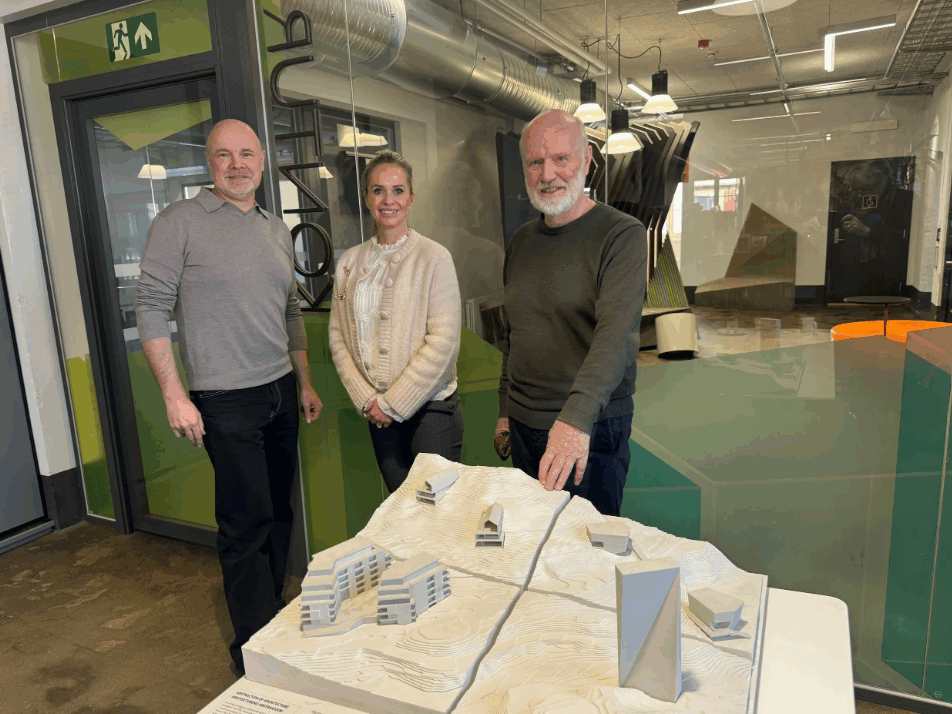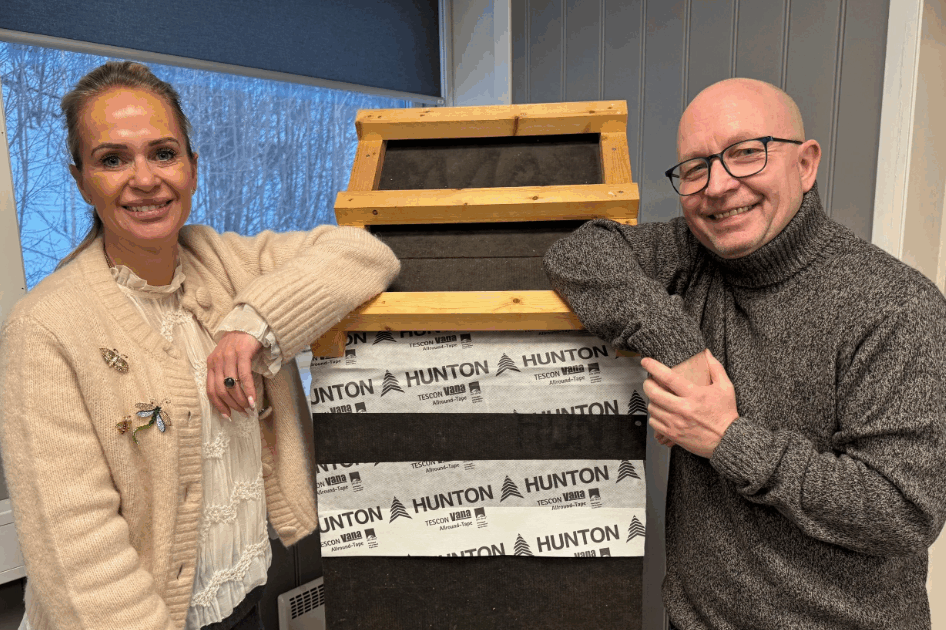The new project manager will be a key member of the cluster and will be responsible for the “Future building solutions” subject group. She will also be project manager for the acoustics project “3LYD”, which has many participants and relates to an important area for strengthening the competitiveness of wood construction.
More company visits are coming up. As are meetings at NMBU in Ås and at NTNU and SINTEF in Trondheim.
Forward-thinking Hunton
The first stop on the “get to know you” tour was Gjøvik, where Julie got to know Hunton Fiber AS. The company has been an active member of the Norwegian Wood Cluster since its inception in 2017, participating in all of the cluster’s specialist groups and in several of the cluster’s projects, including the “3LYD” project.
At Hunton, Technical Manager Thomas Løkken gave an interesting review of some of Hunton’s products.
– Acoustics is one of the areas we focus on. We achieved fantastic sound measurements for Hunton’s wood fiber insulation. A sound wall insulated with Hunton Nativo wood fiber insulation attenuates noise far above the requirement that applies between residential units. We are proud of that. But there are several challenges related to acoustics, so we look forward to the implementation of the “3LYD” project,” says Thomas Løkken.
Hunton Fiber was recently awarded more than NOK 14 million in funding from Innovation Norway to develop its new circular growth medium, Fibergrow®.
– Fibergrow can be used for cultivation in most vegetable productions, such as cucumber and tomato, berries, herbs, flowers and shrubs in nurseries. Fibergrow can fully or partially replace today’s less sustainable alternatives for cultivation,” says Løkken.
– “I’m already looking forward to getting an in-depth tour of both the old and the new Hunton factory. This is a company that is constantly striving for new products and sustainable solutions, which is very inspiring,” says Julie Gedde-Dahl.

Contour with exciting buildings
At Kontur Arkitekter AS’s premises in Gjøvik, Julie met the partners Roar Jacobsen and Jørn Reiner, both of whom are highly committed to good architectural solutions in buildings. Kontur has been a member of the Norwegian Wood Cluster since 2019 and actively participates in relevant professional groups and projects, including the “3LYD” project.
Kontur is an interdisciplinary architectural office that works with a wide range of construction projects, with an emphasis on residential, commercial, school and care buildings.
– “We are now part of the VIER alliance together with five other architectural firms around the country. This strengthens our position for larger assignments,” says Jørn Reiner.
Kontur has, among other things, been the architect for Voldsløkka school and cultural center in Oslo, with Oslobygg as the client. Voldsløkka was opened in August 2023.
– “This is Norway’s first school with a plus-house standard and combines solar and earth energy, environmentally friendly building materials, an energy-efficient building and a unique outdoor area into a European model project,” says Roar Jacobsen. He recently handed over responsibility for the day-to-day running of Kontor Arkitekter to Erik Brett Jacobsen, who was project manager for Voldsløkka School and Cultural Center. Acoustics was one of the key issues there.
– “I’m immediately putting Voldsløkka school on my wish list for inspections,” says the cluster’s new project manager Julie Gedde-Dahl.
New master’s degree at NTNU
During her visit to NTNU in Gjøvik, Julie learned that a new master’s degree in “Building Informatics and Timber Structures” will be offered at Gjøvik from the fall of 2025. Assistant Professor Thomas Haavi briefed her on the plans.
The two-year program will educate civil engineers with knowledge in building informatics, sustainability and wooden structures. The programme focuses on building informatics and how digitalization is becoming increasingly important for the industry, as well as the use of wood in building structures and how digitalization and proper design can facilitate more efficient production.
– Central to the study is thus the challenge of how to exploit the opportunities offered by digital information to build sustainable buildings with efficient processes from design to production. “Wood as a building material can help to reduce the environmental impact in several areas, but requires good expertise in material properties, design and production,” says Haavi.
The program consists of compulsory and elective courses based on the choice of specialization. The student can choose a specialization in digitalization, or sustainable and circular use of wood, or a combination of these. The specialization can take place in collaboration with a company. The basis for admission is a completed bachelor’s degree in engineering or equivalent education.
– “We’re very excited about this program,” says Julie Gedde-Dahl. She has personal experience of candidates with a Danish bachelor’s degree in a similar area and knows that these candidates have skills that are in demand in the market.

